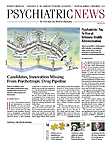Oral arguments about oral care rang through the Supreme Court in mid-October, but the outcome may or may not have much bite when the justices hand down their ruling next spring.
The case at hand hinges on who gets to whiten people’s teeth in North Carolina—dentists or other people. Several medical groups, including APA, are taking an interest in the potential scope-of-practice implications of the case for other professions.
In court, the Federal Trade Commission (FTC) argued that the North Carolina Board of Dental Examiners violated antitrust laws when it sent cease-and-desist letters to nondentists who operated tooth-whitening businesses. The latter say their work should be considered cosmetic, not dental, and thus outside of the dental board’s purview.
State regulatory bodies are exempt from antitrust liability. However, the FTC said that because four of the six members of the board were dentists elected by their professional peers, the board lacked sufficient supervision to be a true part of the state government and thus was merely seeking to eliminate competition.
Furthermore, while the board might regulate dentistry, it had no legal authority to send out the cease-and-desist letters, the FTC said.
The dental board’s attorney responded that it was indeed a state body not subject to antitrust law and that it was also concerned about the safety of patients receiving the peroxide-based treatments.
APA joined the AMA and other medical and dental organizations in an amicus curiae brief supporting the North Carolina Board of Dental Examiners.
The Supreme Court justices addressed the scope-of-practice question during the session, at least in a hypothetical way. Justice Stephen Breyer opined that he wanted decisions about practicing brain surgery to be made by people who knew something about brain surgery. Medical decisions ought to be made by medical professionals, other justices agreed from the bench.
The value of having practitioners on regulatory boards because of their professional expertise has to be counterbalanced by their unwillingness to accept personal liability. The medical and dental groups argued that if North Carolina’s board were deprived of the state’s sovereign umbrella, professionals would not serve on the boards.
The justices’ views were not clear by the end of the oral arguments. A decision broadly in favor of the position of the FTC and the nondentist tooth whiteners might affect similar state boards regulating professions and trades. However, a more narrowly construed decision that addresses just the facts in this specific case would be unlikely to have a wider legal impact, according to experts.
The Supreme Court is expected to hand down its decision in the case by late next spring. ■
The transcript of the oral arguments before the Supreme Court in
North Carolina State Board of Dental Examiners v. FTC can be accessed
here.

